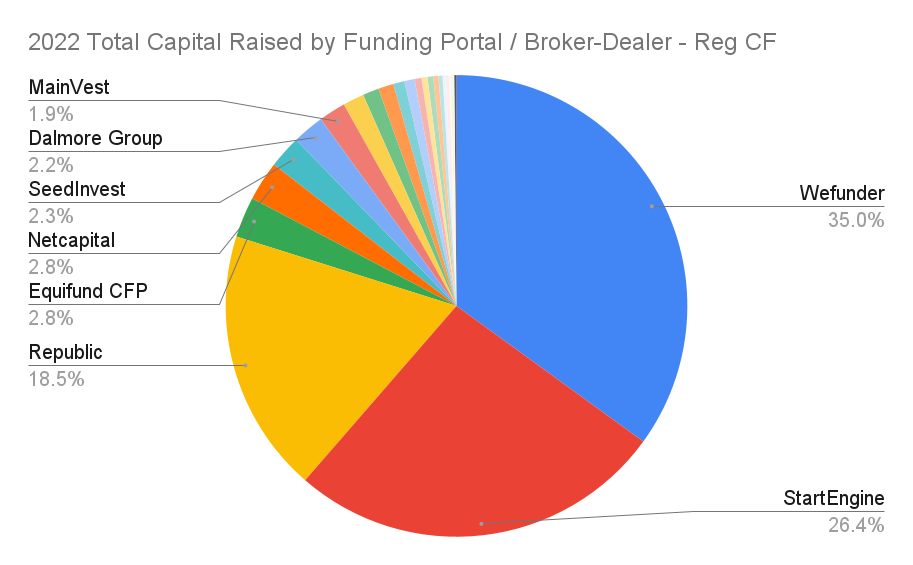Regulation Crowdfunding, commonly known as Reg CF, has reached a significant milestone, surpassing $2 billion in total funds raised. This achievement showcases the success and growth of the crowdfunding industry, providing a new and accessible way for businesses to raise capital. Reg CF was established by the JOBS Act of 2012 and finalized by the Securities and Exchange Commission (SEC) in 2016, allowing companies to raise funds through online sales of securities. Initially, the limit for Reg CF was set at $1.07 million, but it has since been increased to $5 million, enabling companies to mobilize larger amounts of capital.
While the growth of crowdfunding has been remarkable, there have been concerns raised about the potential for fraud. Opponents of Reg CF worry that the lack of regulations and oversight could lead to fraudulent activities. However, it is important to note that issuers must work with regulated entities such as FINRA-regulated Funding Portals or Broker Dealers to ensure compliance with the rules and regulations set forth by the SEC. To date, there have been no significant instances of fraud reported in Reg CF offerings.
One of the most significant impacts of Reg CF is its ability to provide a path for smaller firms to raise capital. Prior to the implementation of Reg CF, many small businesses struggled to access traditional funding sources, making it difficult for them to grow and expand. However, with the emergence of crowdfunding platforms, these firms now have a viable option to raise the necessary funds. Over 6,400 companies have utilized Reg CF to raise capital, highlighting the platform’s dynamism and resilience.
Reg CF Boosts Local Economies
The impact of Reg CF extends beyond the companies raising funds to the local economies they operate in. The investments made through Reg CF have poured billions of dollars into local economies, supporting over 400,000 jobs. These funds are used to hire new employees, purchase equipment, and develop new products and services. The positive influence of Reg CF can be seen in the increased job opportunities and local commerce generated by these companies.
The economic boost provided by Reg CF is further amplified by the multiplier effect. When companies raise funds through crowdfunding, they inject capital into the local economy, creating a ripple effect that benefits various sectors. This increased economic activity can lead to further job creation, increased consumer spending, and overall growth in the local community.
Congress Should Increase Exemption Limit
While Reg CF has been successful in providing funding opportunities for small businesses, there is room for improvement. Industry insiders and advocates are calling for an increase in the exemption limit from $5 million to $20 million. This increase would allow more mature companies to utilize Reg CF as a financing option, reducing investor risk.
By raising the exemption limit, more established companies would be eligible to raise larger amounts of funding through Reg CF. This would provide these companies with additional growth opportunities and allow them to tap into the benefits of crowdfunding. Increased investor participation in these offerings can lead to a more diverse investment landscape and provide greater opportunities for investors to support promising ventures.
CCA Launches AI-backed Investment Vehicle
Recognizing the transformative potential of securities crowdfunding, Crowdfund Capital Advisors (CCA) has launched a new investment vehicle called D3VC. D3VC aims to match promising crowdfunding ventures with artificial intelligence (AI) capabilities. By connecting venture capital and smaller investors to these opportunities, D3VC seeks to leverage the power of AI in the fundraising and investment process. This innovative approach highlights the evolving nature of the crowdfunding industry and its ability to adapt to new technologies and investment strategies.
Reg CF Milestones and Progress
the establishment of Reg CF can be traced back to the JOBS Act of 2012, which paved the way for crowdfunding as a viable financing option for small businesses. The SEC implemented final rules for Reg CF in 2016, allowing companies to raise funds through online sales of securities. The initial exemption limit for Reg CF offerings was set at $1.07 million, but it was later increased to $5 million.
The growth and success of Reg CF can be measured by its milestones. It took around five years for Reg CF offerings to surpass the $1 billion mark, but the second billion was achieved in just two years. To date, over 6,400 companies have utilized Reg CF to raise funds through over 7,400 individual securities offerings. These numbers highlight the widespread adoption of Reg CF as a financing option for businesses across various industries.
Reg CF’s Impact on Entrepreneurship
Reg CF has had a significant impact on the face of entrepreneurship. Over 85% of businesses that have utilized Reg CF to raise funds do so beyond major financial centers, injecting billions of dollars into local economies. This decentralized approach to funding allows entrepreneurs from all regions to access capital and pursue their business ambitions. The positive influence of Reg CF extends beyond the financial realm, creating job opportunities and fostering local commerce.
The ability for small businesses to raise funds through Reg CF has unlocked new possibilities for growth and innovation. By providing a platform for entrepreneurs to connect with investors, Reg CF has democratized the funding process, leveling the playing field for businesses that may have previously struggled to secure traditional funding sources.
Reg CF and Fraud Concerns
While there have been concerns raised about the potential for fraud in Reg CF offerings, there have been no significant instances of fraudulent activities reported. Issuers are required to work with regulated entities such as FINRA-regulated Funding Portals or Broker Dealers to ensure compliance with the rules and regulations set forth by the SEC. This regulatory framework helps mitigate the risks associated with crowdfunding and provides investors with a certain level of protection.
Reg CF offerings undergo scrutiny and due diligence, ensuring that the companies seeking funding are legitimate and have a viable business model. While no system is entirely immune to fraud, the regulatory measures in place for Reg CF offerings provide a level of oversight and transparency that mitigates the risk to investors.
Reg CF’s Role in Local Economic Growth
The impact of Reg CF on local economic growth cannot be understated. The investments made through Reg CF have boosted local economies by nearly $5 billion, driving increased economic activity in the form of job creation, equipment purchases, and product development. The multiplier effect of these investments creates a positive feedback loop, benefiting not only the companies raising funds but also the broader local community.
By injecting capital into local economies, Reg CF empowers small businesses to grow and expand, generating additional job opportunities and stimulating local commerce. The ability for these businesses to access funding through crowdfunding platforms has bridged the gap between traditional financing and small business growth, fostering economic resilience and development.

Reg CF’s Impact on Online Capital Formation
Online capital formation has become a crucial driver of economic activity in the current digital era. Reg CF plays a significant role in this process by providing an opportunity for smaller investors to participate in private securities offerings. Prior to the emergence of crowdfunding platforms, private securities offerings were often limited to institutional investors or high-net-worth individuals. Reg CF has democratized investment, allowing individuals from all walks of life to invest in promising ventures and support entrepreneurial endeavors.
The accessibility and convenience of online crowdfunding have made it an attractive option for both issuers and investors. Crowdfunding platforms provide a user-friendly interface that facilitates the investment process, making it easier for individuals to browse and invest in a wide range of opportunities. This has created a more dynamic and diverse investment landscape, driving economic growth and innovation.
Call for Increased Exemption Limit
Industry insiders and advocates are calling for an increase in the exemption limit for Reg CF offerings from $5 million to $20 million. This rational step would allow more mature companies to utilize Reg CF as a financing option, enabling them to access larger amounts of capital. By increasing the exemption limit, investor risk can be reduced, as more established companies often have a track record and financial stability that inspires confidence.
The proposed increase in the exemption limit reflects the evolving nature of the crowdfunding industry and the need to adapt regulations to accommodate the changing needs of businesses and investors. By expanding the opportunities available through Reg CF, more companies can benefit from crowdfunding as a viable financing option, promoting economic growth and fostering innovation.






